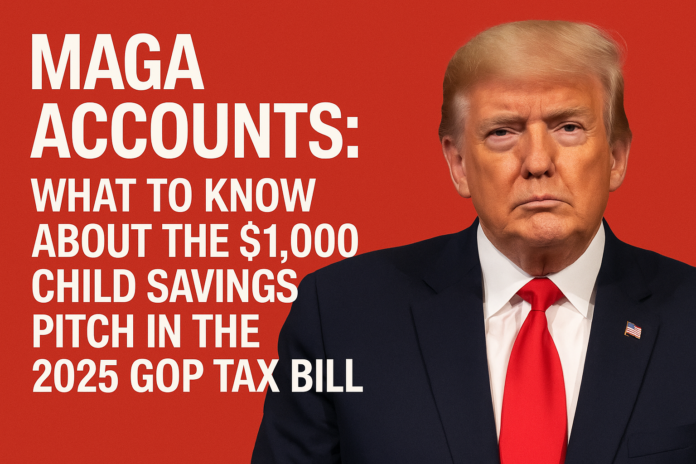As the tax debate in Washington rages for 2025, one plan has gained national appeal: state-sponsored child savings accounts nicknamed “MAGA accounts” intended for long-term financial development for American children. The proposal, which is part of the Republican Party’s overall tax bill and supported by ex-President Donald Trump, seeks to offer an initial government contribution to the tune of $1,000 for every qualifying child.
What Are MAGA Accounts?
MAGA accounts are in essence, federal funded savings accounts designed to provide kids with a financial leg up. By the plan, every newborn or child of a certain age (possibly 10 years) would have a single deposit for $1000 from the federal government. The money would be deposited into a special tax-favored account that has the same structure as a Roth IRA or a 529 college savings plan, and grow tax-free over time.
The aim is to create the incentive for savings habits and financial knowledge in young Americans and at the same time help the families to plan for future demands like education, home ownership, or even their retirement.
Also read : Upto $5,108 Social Security Payment On Wednesday, May 14, 2025
Eligibility and Restrictions
While the finer details of the final legislature are still being argued, early reports indicate that the accounts will be accessible to children from households that earn less than a certain minimum income (perhaps close to $150 000) per year. The account would be limited in terms of rules of withdrawal. For instance, funds can only be withdrawn when the child becomes an adult (18 years old) and can only be applied for approved expenditures such as college education, first time home ownership or vocational training.
There is also talk of further federal contributions based on parental income or private contributions that will inspire families and communities to grow the first $1,000 seed.
A Political Flashpoint
The MAGA Accounts proposal has resulted in a raging partisan feud. Proponents claim that it is a pro-family, forward-thinking measure that does not saddle parents and children with life-long entitlements. Republicans picture it as a prudent option to massive welfare programs such as student debt cancellation or universal child care subsidies.
“This is investing in the future without bloating the welfare state,” said one GOP lawmaker. “We’re giving kids a lift to an American Dream kick-start.”
Not surprisingly, critics from the Democratic side are doubtful. They explain how the program might sound very appealing but lacks any scale or equity to noticeably bridge wealth gaps. Some may say a $1,000 one-time deposit is just symbolic, especially while looking at the increasing cost of education and housing. Others fear that the accounts may be too beneficial to families who are in a good position to invest and develop their sizable funds.
Economic and Social Impacts
Providing policy perspective, MAGA Accounts might provide modest, but rather important, long-term effects. If well-invested on a compound interest investment set up with a conservative return rate of 5-7%, the $1,000 can easily grow to over $2000-$3000 when the kid clocks 18. Although not a huge fortune, it may serve as a relatively good beginning for college savings, business start-ups, or getting housing.
Furthermore, the advocates focus on the psychological benefits of early savings. Research has revealed that children with relatively small savings accounts are much more likely to further their education and make responsible financial decisions, once they grow up.
Also read : $2,500 Stimulus Check in May: Real Deal or Social Media Scam?
The Road Ahead
So far, the fate of MAGA Accounts is still unknown as the larger 2025 tax bill continues making its way through Congress. The proposal is likely to be revised by the negotiations in committees and might even be changed or combined with similar proposals that would seek to create child tax credits or education incentives.
Nonetheless, the plan marks a departure from Republican economic policy ,a combination of the populist talk with the material benefits that accrue to the households. Regardless of whether the “MAGA Accounts” become law or become a messaging tool, they have already redefined a portion of the national conversation of family support and generational wealth.








